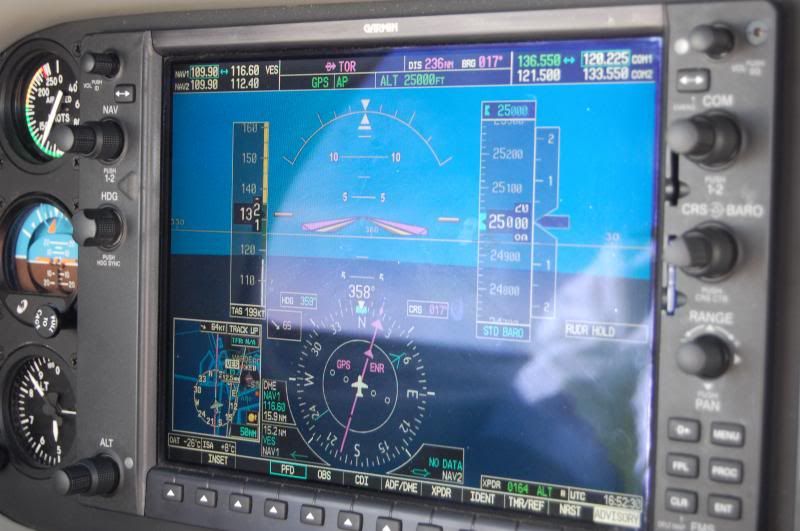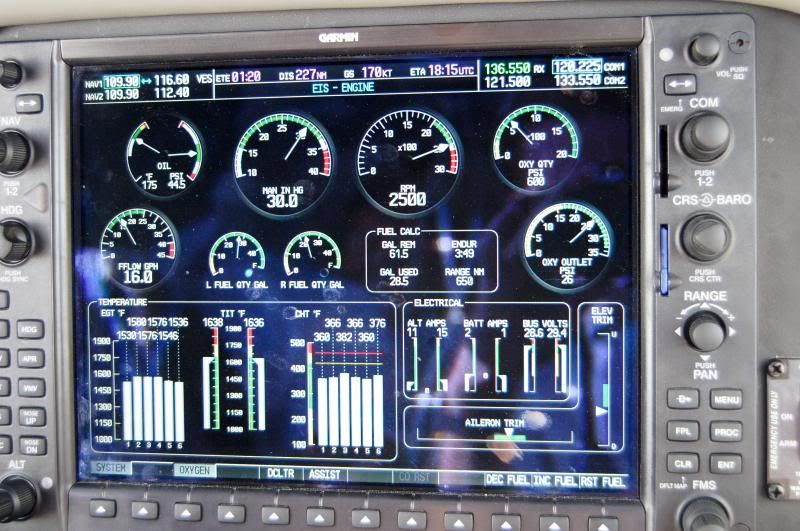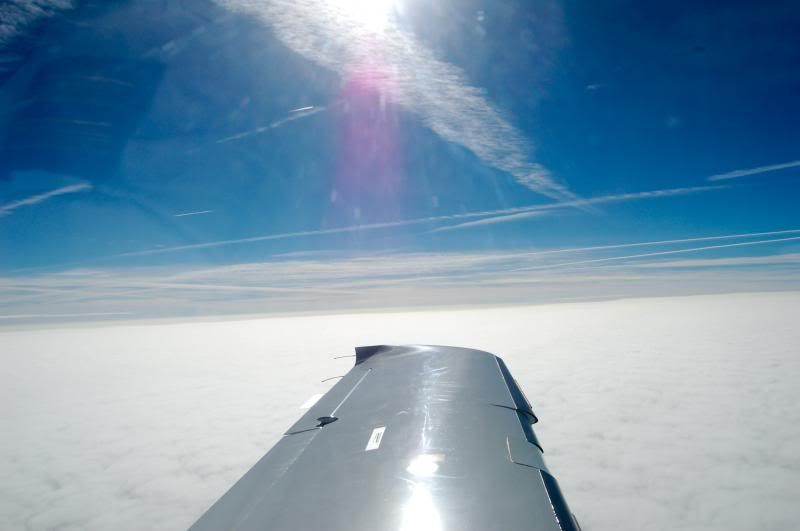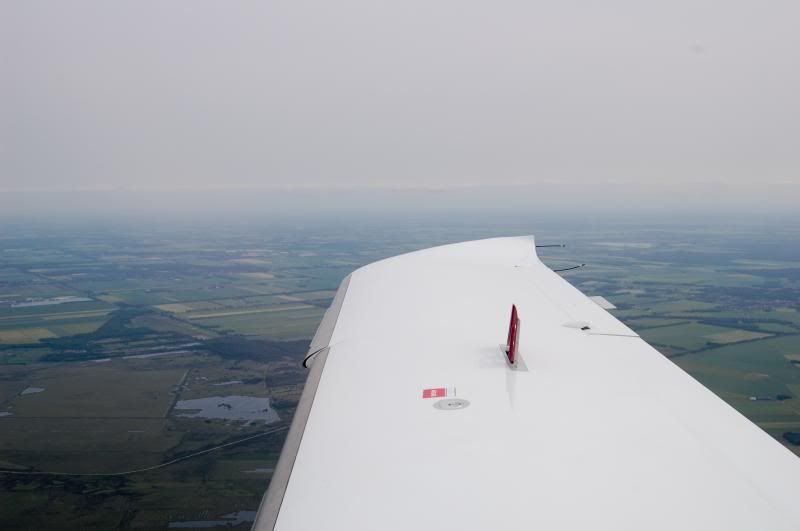columbia 400
Join Date: Aug 2007
Location: Utterly insignificant little blue-green planet, unregarded yellow sun, unfashionable end, western spiral arm, Milky Way
Age: 38
Posts: 276
Received 0 Likes
on
0 Posts
The flight school at which I used to instruct had one. I've instructed on it and flown it around Norway, as well as some trips to the UK, Denmark, Germany and Austria. Ours was a Cessna Corvalis with G1000, but it shouldn't make much of a difference other than the badge.
In my opinion it flies better than the Cirrus, although they are quite similar, so it might be down to personal preference, but it's a bit faster, and the feel of the controls is much better, so I like it better. I never could get quite used to the way the stick moves in the Cirrus after having flown the 400/Corvalis. The controls are all pushrod-operated and feel great. Search around on Youtube, you will see it being aerobatted around by Sean Tucker, so it is quite manouverable and capable.
It is clearly a long-distance IFR tourer. Although you of course can use it as a VFR runabout, it is quite uneconomical in this role. The visibility over the nose isn't all that great for VFR flying either. Get it up high, though, and it really comes into its own. I had it up to its service ceiling of FL250 last year, with three people and some luggage onboard, and it climbed at 1000fpm all the way to FL160 or thereabouts, and was still climbing with 500fpm up to FL250. Pretty impressive. If you climb up to the mid teens or so and sit there with oxygen, it will happily do 200kts TAS, and you can run it lean of peak, so it'll consume about 16 gph, which is not too bad for the speeds you're getting. The airbrakes make you feel like a hotshot, but they are really necessary, as you should keep the power above 15" manifold pressure to avoid shock cooling. At FL100, if you pull the power back to 15" and try to descend, you'll be hard pressed getting the speed to drop below 150-160 kts.
As an example of what it will do, I flew it from ENTO Torp in Norway to EGSC Cambridge last year. Three people with weekend luggage and cameras for Flying Legends ( ), and our route, if you want to chuck it into Skyvector, was ENTO - AAL - EEL - ABBOT - EGSC. That's 640nm, and we did the trip in one hop in 3:30, cruising at FL180.
), and our route, if you want to chuck it into Skyvector, was ENTO - AAL - EEL - ABBOT - EGSC. That's 640nm, and we did the trip in one hop in 3:30, cruising at FL180.
Earlier this year I flew it to our maintenance base, about 20 minutes away from our home field. We were at 1000 ft due to low clouds, it was quite a bumpy day, and even with the power at 20"/2200rpm I was struggling to keep it down below 140kts. On that note, another positive item on the list is that the 400 is certified in the Utility category (+4.4G) all through its envelope.
It is of course quite an expensive kite to operate. I'd say it costs about the same as a C206, which has an engine of similar size. One thing to be VERY careful about, of course, is hangar rash. Ours was whacked by a wingtip, and spent several months hangared, being inspected for cracks and weakening of the structure, as well as repair, refinishing and repainting of the damage. If you crack the windscreen or any of the windows, I'd imagine they are a royal pain to replace, since they are laminated in.
As you probably can imagine, it's not a short-field kite. I wouldn't operate it from anything much shorter than a 700m strip. It can do grass, but that would have to be a smooth field, as the undercarriage is quite stiff. It has a very modern and clean aerofoil, which is part of why it goes like stink, but that also means that it stops flying very abruptly in the stall, and has to be flown all the way down, rather than stalled on like a "lesser" Cessna. This consumes a bit of runway in itself.
Regarding the slow-flight side of the envelope, it's interesting to note that the ailerons are effective in the stall, and the POH even states that they can be used during stall and spin recovery.
Comfort-wise, it has a great autopilot in the GFC700, the seats are very good, it's quite roomy, and it has air conditioning if you like that as an option.
All in all, though, it's a great plane, very nice to handle, and it goes like stink I'd definitely pick a 400/Corvalis over a Cirrus.
I'd definitely pick a 400/Corvalis over a Cirrus.
Some pics:




In my opinion it flies better than the Cirrus, although they are quite similar, so it might be down to personal preference, but it's a bit faster, and the feel of the controls is much better, so I like it better. I never could get quite used to the way the stick moves in the Cirrus after having flown the 400/Corvalis. The controls are all pushrod-operated and feel great. Search around on Youtube, you will see it being aerobatted around by Sean Tucker, so it is quite manouverable and capable.
It is clearly a long-distance IFR tourer. Although you of course can use it as a VFR runabout, it is quite uneconomical in this role. The visibility over the nose isn't all that great for VFR flying either. Get it up high, though, and it really comes into its own. I had it up to its service ceiling of FL250 last year, with three people and some luggage onboard, and it climbed at 1000fpm all the way to FL160 or thereabouts, and was still climbing with 500fpm up to FL250. Pretty impressive. If you climb up to the mid teens or so and sit there with oxygen, it will happily do 200kts TAS, and you can run it lean of peak, so it'll consume about 16 gph, which is not too bad for the speeds you're getting. The airbrakes make you feel like a hotshot, but they are really necessary, as you should keep the power above 15" manifold pressure to avoid shock cooling. At FL100, if you pull the power back to 15" and try to descend, you'll be hard pressed getting the speed to drop below 150-160 kts.
As an example of what it will do, I flew it from ENTO Torp in Norway to EGSC Cambridge last year. Three people with weekend luggage and cameras for Flying Legends (
 ), and our route, if you want to chuck it into Skyvector, was ENTO - AAL - EEL - ABBOT - EGSC. That's 640nm, and we did the trip in one hop in 3:30, cruising at FL180.
), and our route, if you want to chuck it into Skyvector, was ENTO - AAL - EEL - ABBOT - EGSC. That's 640nm, and we did the trip in one hop in 3:30, cruising at FL180.Earlier this year I flew it to our maintenance base, about 20 minutes away from our home field. We were at 1000 ft due to low clouds, it was quite a bumpy day, and even with the power at 20"/2200rpm I was struggling to keep it down below 140kts. On that note, another positive item on the list is that the 400 is certified in the Utility category (+4.4G) all through its envelope.
It is of course quite an expensive kite to operate. I'd say it costs about the same as a C206, which has an engine of similar size. One thing to be VERY careful about, of course, is hangar rash. Ours was whacked by a wingtip, and spent several months hangared, being inspected for cracks and weakening of the structure, as well as repair, refinishing and repainting of the damage. If you crack the windscreen or any of the windows, I'd imagine they are a royal pain to replace, since they are laminated in.
As you probably can imagine, it's not a short-field kite. I wouldn't operate it from anything much shorter than a 700m strip. It can do grass, but that would have to be a smooth field, as the undercarriage is quite stiff. It has a very modern and clean aerofoil, which is part of why it goes like stink, but that also means that it stops flying very abruptly in the stall, and has to be flown all the way down, rather than stalled on like a "lesser" Cessna. This consumes a bit of runway in itself.
Regarding the slow-flight side of the envelope, it's interesting to note that the ailerons are effective in the stall, and the POH even states that they can be used during stall and spin recovery.
Comfort-wise, it has a great autopilot in the GFC700, the seats are very good, it's quite roomy, and it has air conditioning if you like that as an option.
All in all, though, it's a great plane, very nice to handle, and it goes like stink
 I'd definitely pick a 400/Corvalis over a Cirrus.
I'd definitely pick a 400/Corvalis over a Cirrus.Some pics:




Thread Starter
Join Date: Jul 2010
Location: belgium
Age: 64
Posts: 52
Likes: 0
Received 0 Likes
on
0 Posts
Hi Semmern
Thanks for your reply,
I did get my ppl on a cirrus sr20
Want to upgrade now to IFR
Should I be warried about the Corvalis payload?
If 700 meters strips are ok, then I d be happy, there s lots of those around
Thanks so much
Thanks for your reply,
I did get my ppl on a cirrus sr20
Want to upgrade now to IFR
Should I be warried about the Corvalis payload?
If 700 meters strips are ok, then I d be happy, there s lots of those around
Thanks so much
Join Date: Sep 2006
Location: Munich, Germany
Posts: 271
Likes: 0
Received 0 Likes
on
0 Posts
I did get my ppl on a cirrus sr20
Want to upgrade now to IFR
Should I be warried about the Corvalis payload?
If 700 meters strips are ok, then I d be happy, there s lots of those around
Want to upgrade now to IFR
Should I be warried about the Corvalis payload?
If 700 meters strips are ok, then I d be happy, there s lots of those around
Weight and balance and takeoff distance are important and vital performance data for consideration. Well, just reflect on the Cirrus POH (Sections 5 & 6) and you would have little difficulties appreciating the performance of Cessna Corvalis.
You definitely should be worried about Corvalis payload if you want to fly safely. Takeoff distance of Corvalis is 1900ft and that's less than 700 meters, but that doesn't mean that you should lay back and not engage the appropriate thought process of ensuring situational awareness.
I've flown the Cessna TTX and SR22 and I feel very comfortable flying both planes. However, I prefer SR22. it is inevitable to pay special attention to the specific characteristics of the type when engaging them.
Have fun.
WP
Join Date: Mar 2008
Location: Belgium
Age: 46
Posts: 137
Likes: 0
Received 0 Likes
on
0 Posts
Another significant difference is that the Columbia in not certified for FIKI and the Cirrus is. I think the Corvalis (post-Lancair era) is. But if you are aiming for flight levels in western-Europe and it is within your budget, I'd give FIKI a good look.
I 'd love to see a Columbia in Belgian airspace, though...
I 'd love to see a Columbia in Belgian airspace, though...

Thread Starter
Join Date: Jul 2010
Location: belgium
Age: 64
Posts: 52
Likes: 0
Received 0 Likes
on
0 Posts
Gentlemen
Both SR22T and Corvalis/Columbia are very nice planes. traveling planes
Trying to list pro's and con's of both aircraft.
Thanks for your replies
Both SR22T and Corvalis/Columbia are very nice planes. traveling planes
Trying to list pro's and con's of both aircraft.
Thanks for your replies




